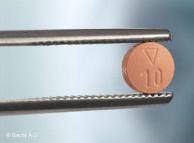
November 9, 2011 — Janssen Pharmaceuticals Inc. announced the U.S. Food and Drug Administration (FDA) has approved Xarelto to reduce the risk of stroke and systemic embolism in patients with nonvalvular atrial fibrillation (AFib). Xarelto is an oral anticoagulant that offers once-daily dosing without the need for routine blood monitoring.
"Today's approval of Xarelto offers physicians a new option to reduce stroke risk in patients who are living with atrial fibrillation, and the continuous threat of strokes," said Gerald V. Naccarelli, M.D., professor of medicine, chief of division of cardiology, Pennsylvania State University College of Medicine and Milton S. Hershey Medical Center. "A majority of my atrial fibrillation patients are on multiple medicines for conditions that further increase the risk of stroke. I welcome a therapy like Xarelto that has demonstrated effectiveness and safety in these patients, with the added convenience of a once-daily dose."
The drug is approved to reduce the risk of stroke and systemic embolism in patients with nonvalvular AFib at a dose of 20 mg once daily; it is also approved at 15 mg once daily for patients with moderate to severe renal impairment, taken with the evening meal. There are limited data on the relative effectiveness of Xarelto and warfarin in reducing the risk of stroke and systemic embolism when warfarin therapy is well controlled.
AFib is the most common cardiac rhythm disorder and affects more than 2.2 million people in the United States. In AFib patients, the heart's irregular heartbeat makes them vulnerable to the formation of a blood clot in the atria; this sometimes can break off and travel to the brain, potentially resulting in a stroke.
Common conditions like high blood pressure, heart failure, diabetes, and prior stroke, along with being over the age of 75, are factors for increased risk of stroke in AFib patients. That group is at a five-fold increased risk for stroke compared with the general population.
"The prevalence of atrial fibrillation is increasing, and many patients who are at risk for stroke are not currently being managed effectively or optimally," said Robert M. Califf, M.D., ROCKET AF study co-chairman and vice chancellor for clinical research at Duke University. "In clinical studies, Xarelto was shown to be effective in patients who are at increased risk of stroke, and especially in those with co-morbidities such as high blood pressure or diabetes, and other factors that increase the risk of stroke. These patients represent many of those with the most to gain from effective anticoagulation."
Approval was based on the double-blind Phase 3 ROCKET AF (Rivaroxaban Once-daily oral direct Factor Xa inhibition Compared with vitamin K antagonism for the prevention of stroke and Embolism Trial in Atrial Fibrillation) global clinical trial. In the trial, once-daily rivaroxaban effectively reduced the risk of stroke and systemic embolism in patients with nonvalvular AFib, with major bleeding rates comparable to warfarin. In bleeding categories of great concern, such as bleeding into a critical organ and fatal bleeding, fewer events were observed with rivaroxaban. In the categories of transfusions and gastrointestinal bleed, more events were observed with rivaroxaban.
For more information: www.janssenpharmaceuticalsinc.com


 January 28, 2026
January 28, 2026 









